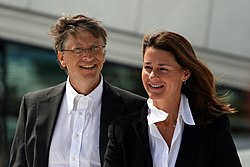| (Photo credit: Wikipedia) |
There I am, minding my business looking at a news website, when my eye catches one of those annoying little 'On the web' link-bait thingies. 'Bill Gates' predictions for 2030' it says. Fair enough. I refuse to click on 'em as a matter of principle (my furious rebellion has come to this over the years) but a while later I made my own way over to the 2015 Gates Note, which is Bill and Melinda's version of the sort of photocopied note that goes with the Christmas card to let everyone know little Gypsophila is now taking ballet lessons and wee Roderick has stopped eating light bulbs.
Bill and Melinda make a number of predictions for the future, slavishly picked up and amplified by all manner of media. One of them is 'Africa will be able to feed itself'. Which is nice. I was reading all this worthy guff, all the time being keenly aware of a nagging sensation about Bill Gates that I've tended to have since the days when, as a journalist, I was in receipt of official letters of complaint from Microsoft about the things I had to say about them - and him.
I saw a little infographic thingy, the 'Four keys to agricultural productivity', sourced from AGRA - the Alliance for a Green Revolution in Africa. These sorts of acronym pop out at me nowadays, they usually mean 'Big Business/Agro Disguised As Something You'd Like More'. Alliances, Committees and Action Groups funded by Big PR to front some vested interest or another.
And such is AGRA. The weasel comes in their own FAQ:
Can resource-poor smallholder farmers afford to buy seed every year?
Yes. In fact, we are finding that seed companies regularly sell out of their stocks every year, and still cannot keep up with demand. Selling seed in small packages and making it available at the village level has greatly increased farmer adoption of improved seed. Mobile money has likewise boosted sales of seed in remote villages. AGRA also works with farmer organizations that offer group buying opportunities, as well as access to credit. What we are increasingly seeing is that, by adopting improved seed, farmers are becoming more prosperous and more able to purchase additional seed, as well as other inputs.
Does AGRA support GMO in Africa?
AGRA invests in conventional, farmer-driven breeding as a way to give farmers access to high-quality seed at prices they can afford. The big problem for farmers in Africa is access to reliable seed. Currently, only about one quarter of Africa's smallholder farmers have access to good seeds, compared to, for instance, 80 percent of farmers in China. New varieties are needed because many of the seeds farmers use today are inherently low-yielding and vulnerable to crop diseases and pests.
Well, hold on a moment, folks. What was wrong with a straight 'no' to that last question? And why would farmers HAVE to afford to buy seed every year?
It's interesting that everyone here is talking about 'maize' when they mean 'corn' or 'sweet corn'. Is it just my nasty, suspicious mind that tars us all with avoiding an increasingly unpopular and maligned word? Did you know that Canola was a brand name, coined (at least in part) because North American consumers wouldn't like the sound of 'rape seed'? Or that over 90% of the North African rape crop is Genetically Modified (GM)? Or that over 95% of American sweetcorn is GM - designed to be resistant to chemicals such as Monsanto's poisonous Roundup herbicide and so allowing the crop to be drenched in such high levels of the awful stuff that it makes its way into the food chain - and the food that people eat?
AGRA was founded in 2006 through a partnership between the Rockefeller Foundation and the Bill and Melinda Gates Foundation.
So we take a look at this drought resistant 'maize' Bill's PR guy is waffling on about. It would seem 'Joyce Sandiya' in Tanzania was likely planting ZM 309 or ZM 523, two varieties of hybrid corn developed by CIMMYT (another acronym right there, this time for the 'International Maize and Wheat Improvement Center', whose research into drought resistant corn was backed by, wait for it, the Bill and Melinda Gates Foundation and the Howard G. Buffett Foundation). It was planted in Malawi in 2009 to great success.
Which is great, right? We're feeding Africa. Yay.
Except I can't help feeling unsettled by some of CIMMYT's bedfellows. They're working with Monsanto, the poster child for egregious GM and a company in which one Mr Gates' Foundation has a substantial, 500,000 share, investment (he's also invested in GM company Cargill but is tight-lipped about both investments). They're also linked to genomics company GeneMax, 'big six' GM company DuPont and agrochemical and genomics company Syngenta. Their 'advisory board' have strong links to Monsanto and Cargill.
They've got GM scrawled all over them.
It's interesting looking at all the coverage of their work, how they always partner with a local authority/research associate and ensure the local boys are upfront when it comes to the headlines and credit. Again, that's just me being suspicious and remembering the techniques used to publicise Microsoft 'win' stories back in the day.
You won't be surprised by now to learn that 25-year former Monsanto executive and GM research pioneer Robert Horsch is the deputy director for agriculture at the Bill and Melinda Gates Foundation.
So there's Africa's hope for the future, right there. Bound to buy their seeds every year (wait for the prices to go up), mired in debt and tied to restrictive contracts and drenched in glyphosate herbicides, producing poisoned food in thrall to big agribusiness that snuck in under the coverage of enlightened philanthropy.
You really couldn't make it up...



1 comment:
On the good news front, are you aware that the Netherlands recently outlawed glyphosphate?
Post a Comment